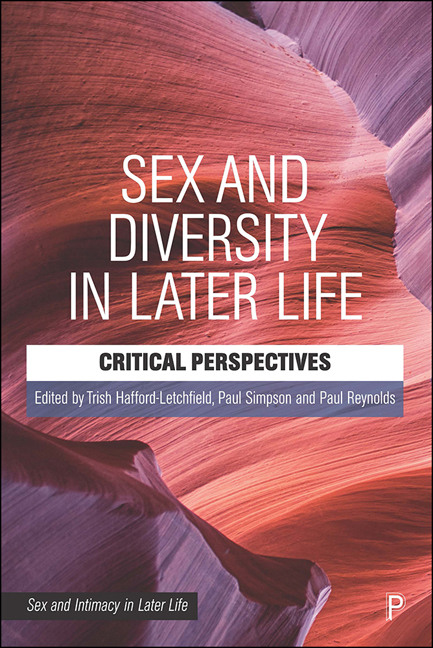Book contents
- Frontmatter
- Dedication
- Contents
- List of figures and tables
- Notes on editors and contributors
- Series editors’ introduction
- Foreword
- 1 Sex and intimacy in later life: a survey of the terrain
- 2 Sexual expression and pleasure among black minority ethnic older women
- 3 Sexual desires and intimacy needs in older persons and towards the end of life
- 4 Heterosexual sex, love and intimacy in later life: what have older women got to say?
- 5 Sex and ageing in older heterosexual men
- 6 Sex and older gay men
- 7 Thinking the unthinkable: older lesbians, sex and violence
- 8 Splitting hairs: Michel Foucault’s ‘heterotopia’ and bisexuality in later life
- 9 The age of rediscovery: what is it like to gender transition when you are 50 plus?
- 10 Ageing asexually: exploring desexualisation and ageing intimacies
- 11 Older people, sex and social class: unusual bedfellows?
- 12 Final reflections: themes on sex and intimacy in later life
- Index
11 - Older people, sex and social class: unusual bedfellows?
Published online by Cambridge University Press: 21 December 2021
- Frontmatter
- Dedication
- Contents
- List of figures and tables
- Notes on editors and contributors
- Series editors’ introduction
- Foreword
- 1 Sex and intimacy in later life: a survey of the terrain
- 2 Sexual expression and pleasure among black minority ethnic older women
- 3 Sexual desires and intimacy needs in older persons and towards the end of life
- 4 Heterosexual sex, love and intimacy in later life: what have older women got to say?
- 5 Sex and ageing in older heterosexual men
- 6 Sex and older gay men
- 7 Thinking the unthinkable: older lesbians, sex and violence
- 8 Splitting hairs: Michel Foucault’s ‘heterotopia’ and bisexuality in later life
- 9 The age of rediscovery: what is it like to gender transition when you are 50 plus?
- 10 Ageing asexually: exploring desexualisation and ageing intimacies
- 11 Older people, sex and social class: unusual bedfellows?
- 12 Final reflections: themes on sex and intimacy in later life
- Index
Summary
If youth is associated with sexual vitality, older people are thought to represent the death of sexuality (Mahieu et al, 2014). There are few media images that validate older people as sexual beings, and the physical, aesthetic and status-related losses associated with age contribute to thinking of them as unattractive and thus uninterested in sex (Garrett, 2014). It is unsurprising then that older people come to internalise beliefs concerning their non-sexual or post-sexual status (Garret, 2014; Simpson et al, 2018).
The ageism just described appears thoroughly normalised. Indeed, what I term ‘ageist erotophobia’ (Simpson et al, 2018) that is disgust at, refusal or more often failure to imagine or acknowledge older people as sexual beings, finds resonance in the observation that sex and intimacy have largely been ‘designed out’ of social policy, care practice and academic research concerning later life (Hafford-Letchfield, 2008). See also Bauer et al (2012) in Australia, Doll (2012) in the US and Villar et al (2014) in Catalonia/Spain). Despite an emerging international scholarship on ageing sexuality, on rare occasions when the subject has been acknowledged in the professional practice literature, it has largely been framed as counterintuitive, inappropriate, or a threat or problem to be managed (Doll, 2012). This applies especially to individuals affected by a dementia/loss of cognition (Drakeford, 2006). Recognition as an older sexual being seems rare. At best, there appears grudging respect for if not pathologisation of the predatory, middle-aged, middle-class ‘cougar’ (Kaklamanidou, 2012) and the ‘randy old goat’ still interested in sex despite advancing years (Simpson et al, 2017). Yet, pressures towards what I would call ‘compulsory non-sexuality’ can have serious ramifications for the mental health/self-esteem and quality of life of older people (Hinchliff et al, 2019).
The stereotypical thinking outlined earlier is damaging not just because it demeans but also because it obscures understanding of the realities of older people's lives (Simpson et al, 2018). Older people's accounts range from elected or compulsory non-sexuality, to a desire for sexual opportunity, through to continuation of sexual relations (Bauer et al, 2012; Simpson et al, 2018). Indeed, it is possible that sexual experimentation may be more available to older people with more time and leisure than younger people with jobs, caring responsibilities and various social demands.
- Type
- Chapter
- Information
- Sex and Diversity in Later LifeCritical Perspectives, pp. 199 - 216Publisher: Bristol University PressPrint publication year: 2021



